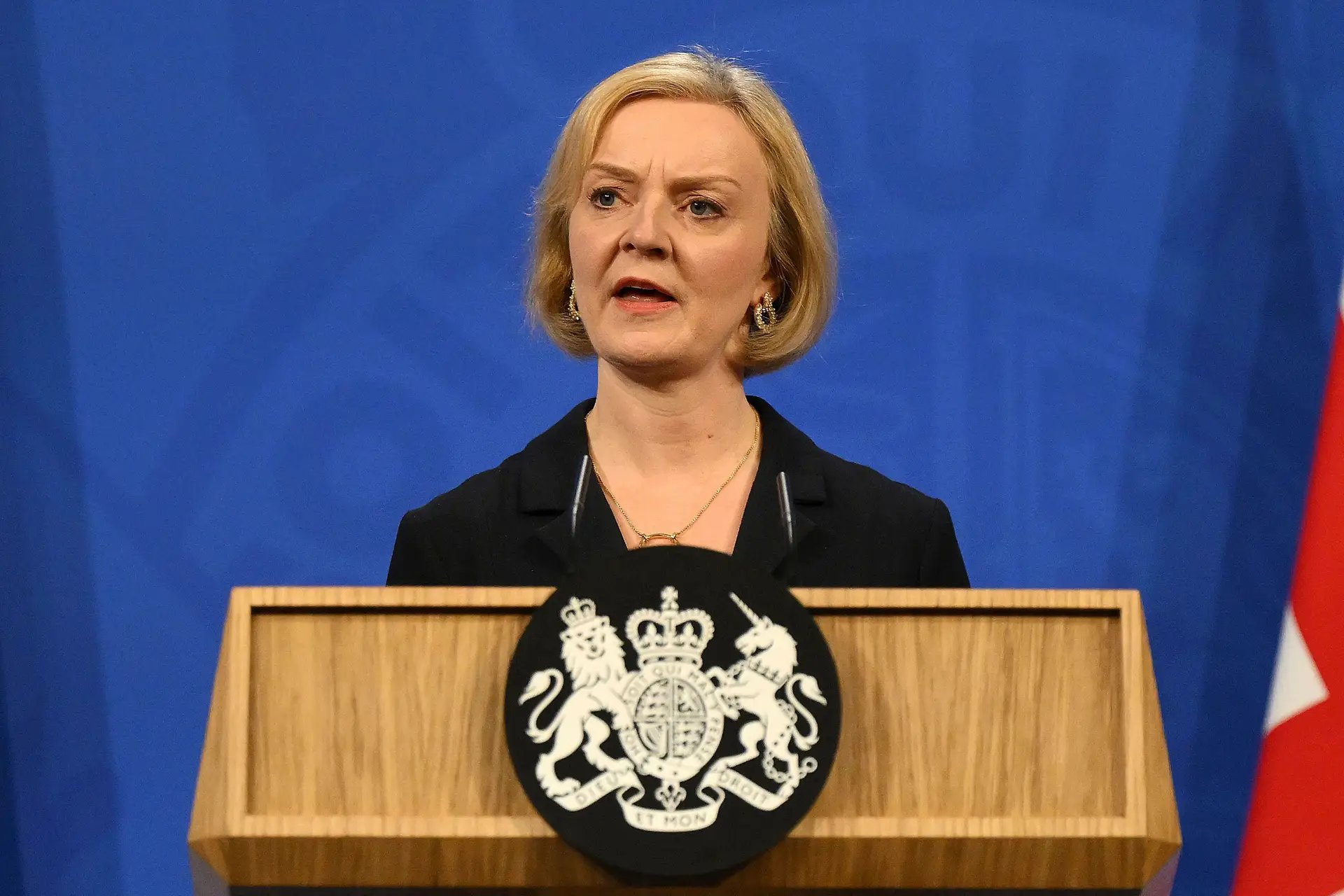Spain News Media
-

AGUILAR REFORMS THE ELECTORAL LAW ONCE AGAIN
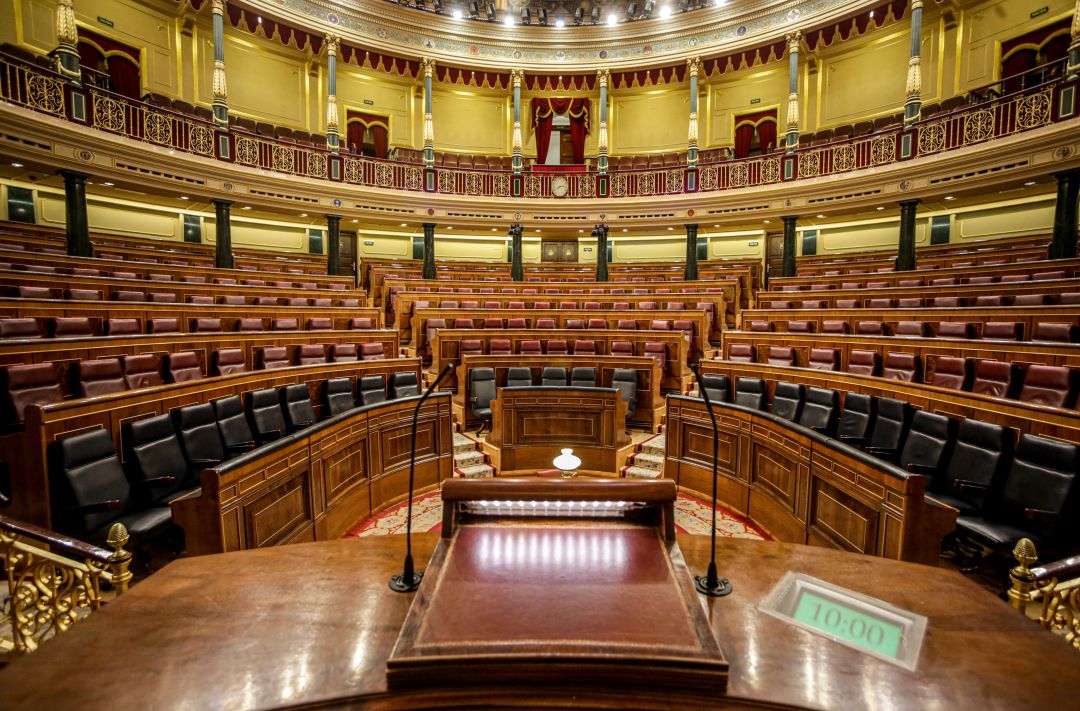
The reform will just apply to the Congreso de los Diputados, which size will be reduced as the current system has been proven innefficientThe Extraordinary Cabinet Meeting (Consejo de Ministros Extraordinario) passed yesterday yet another reform of the Spanish Electoral Law, that will only apply to the Congreso de los Diputados as its size will be ‘significantly reduced’. The Congreso, which used to have 350 members of Parliament, saw its size increased to 768 members after the electoral reform, to increase representativity and political parties within the system, yet the new method has been proven to be innefficient, as debates take longer than expected and the chamber is slower than ever before.
Jesús Aguilar, who is on a roll after his party won the election in Castilla y Leon (even though he has been criticised for authorising the regional President, Alfonso Fernández Mañueco, to sign a Government agreement with the far-right party VOX) and the election in Andalucia, achieving a never-seen-before-absolute majority for the Partido Popular with Juanma Moreno as candidate, wants to take advantage of the great results his party is having and make up a new electoral system that benefits the big parties like the Partido Popular and the Partido LSocialista and damages the representation of smaller ones, like PACMA, Tú Patria or the regionalist parties.
The Minister for Home Affairs, Ana Beltrán, had to undergo the many questions of the journalists about this system, saying that some of the opposition claims that we have compiled on this article are ‘blatantly false’ and that ‘the Government is not reforming the system to gain advantage over its opponents’, but rather to ‘speed up Congress debates’. Ciudadanos, the main ally of the Partido Popular, has warned the Partido Popular that if they call a new general election after the passing of this law, they won't be able to expect another 4-year-long agreement. Will Jesús Aguilar call another General Election and try to gain an absolute majority once again? Only the President himself knows.
-

USING THE SYSTEM TO GAIN AN ADVANTAGE
Opinion piece by Estefanía Molina
Aguilar, in a press conference this morning announcing his call for a general election on July 24thEtta James' ‘At Last’ plays in the background. We are in the Palacio de la Moncloa, more exactly in the Consejo de Ministros building, first floor. It's Thursday, June 16th; and Jesús Aguilar has given the task to his Vicepresident, Soraya Sáenz de Santamaría, of preparing the royal visit to the Empire of Inimicus. His secretary, Carlos, has been ordered not to transfer any call to him for 2 hours. The door is closed, only Aguilar has the key to open it. He is not furious, he is not mad at anyone; he needs silence and to think what is over the table carefully. The balcony is open, even though the heat wave Madrid is undergoing is exhaustive to any human. Not even a single breeze can be felt.
Sounds like a novel, right? Well, it is not. According to sources close to the now Acting President of the Kingdom of Spain, Aguilar had been planning this for a week, and if things in Andalucía went alright, he would give it the green light. The polls are favourable to him, with all of them saying he would regain the absolute majority he lost 2 years ago, reduce Ciudadanos to ashes and ending with all those ridicolous parties that his first reform brought to the Congreso de los Diputados. The plan was perfect, he just needed the ideal excuse to call the election.
Ciudadanos, whose relationship with the Partido Popular has turned for the worse in the last year and a half, fell for the trap Aguilar prepared for them; and was planning a non-confidence motion at the backs of the President, without being aware that several loyal deputees were warning the Spanish President about what they were going to do. They failed in Murcia, in Madrid and now, they failed to kick Aguilar out. Ayuso, the President of the Autonomous Community of Madrid, warned the President that he had to act like if he "didn't know it" and "call the election as soon as the electoral law was passed". He did exactly what she suggested.
Yesterday night, the reform was passed, and Ana Beltre us dismossed the critics that said it was going to be used for meeting the "Partido Popular's electoral interests". This morning, Aguilar summoned the press for a conference, and told us what he had been warned of, before confirming he was indeed calling a general election. He says he is saddened for having to do things this way, but that he cannot risk the will of the Spanish people to be kidnapped by unwanted parties. Ciudadanos called him a "traitor", and the Socialist Party said that "they have told everyone what would happen if the law passed". Will anyone get him out of Moncloa? Only time will tell. But one thing seems clear: Aguilar used the system, and he gained the hugest advantage ever given to a President that calls for an early election.
-

AND HE CAME BACK (SOON)

Jean-Claude Juncker, arriving this morning at EuropolisJean-Claude Juncker will surely have to write another book, but with a different title, after his victory on the European Commission election against the Duchian candidate, Calvin Künhert, that makes him the new Premier Commissioner of the European Union. As a fun fact, he accomplished his first promise just after the results were proclaimed: he came back (soon), which also uses to be the title of his first book. However, what will Mr. Juncker face in his new term serving the Europeans? What challenges are waiting for him?
Firstly, he will have to do a new budget for the European Union, which is expected to raise massively after the European Development Agency gets a bump on its numbers and the European Agricultural Fund is created, something that is expected to happen before taking the EU's budget to the Council for discussion and vote. Juncker will also have to face the reform of the European Court of Justice and the European Council: the first one will be easier than the second, with the latter requiring a previous dialogue with the Council Speaker, Iras Tilkannas. According to Juncker, he wants "to include the Speaker on the reform so the Commission gets a better view on what the Council should become in the future".
With his nickname being "the orchestra conductor", Juncker will now properly do that from the position that is supposed to: the Premier Commissioner seat. A new era begins for Europe, and the old but smart Jean-Claude seems to be ready to deliver lots of changes in just four months. Will he call his second book "delivering"? Time will tell.
-

MINISTERS SWORN-IN: WHAT TO EXPECT FROM THE NEW MINISTERS?
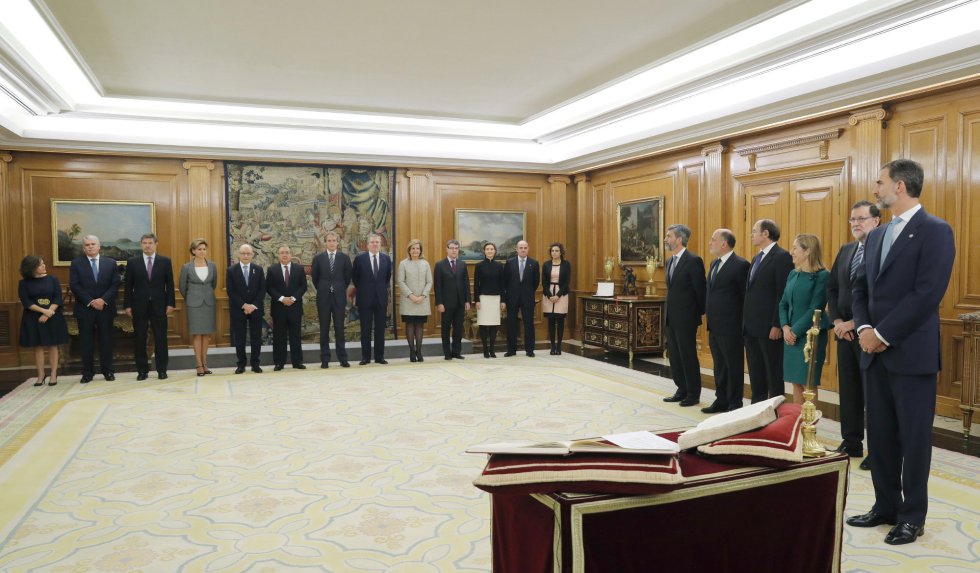
A stock picture of the swear-in ceremonyThe new Aguilar cabinet has sworn-in in front of King Felipe VI today at the Palacio de la Zarzuela, marking the start of the 4th Aguilar cabinet after the Congress approved the inauguration of Jesús Aguilar and the King designated him as candidate for the country's presidency. The Cabinet keeps the number of members (22 ministers and the President of the Government) and the number of women on the cabinet increases to 10, being the cabinet with the higher parity of representation in the Spanish history, and 8 new ministers.
What should we expect from them? According to President Aguilar, these new Ministers have been chosen because of their qualities and devotion to the Ministry they have assumed, and therefore the Spanish citizens "will be their first priority". In the 'relevant' ministries, there have been two important changes: the now former Galician President, Alberto Núñez Feijóo, now becomes Minister for Home Affairs replacing Ana Beltrán; and Pascal Donohoe replaces Luis de Guindos, who Jesús Aguilar intends to fill in as candidate to the ECB's Presidency, in the Ministry of Economy and Competitiveness.
Another big change to the Government composition comes with the division of the Ministry of Science, Innovation, Research, Digital Transformation and 2030 Agenda into two different ministries: Anja Karliczek will assume Science, Innovation and Research while Víctor Calvo-Sotelo assumes Digital Transformation, Cybersecurity and 2030 Agenda. While Calvo-Sotelo is a known face, being directly involved in the Hispano-Inquistan discovery of Atlantis, Anja Karliczek is a direct suggestion from the Germanium President, Erma Arbeit. Aguilar has also included in his cabinet a Grequian and a French Minister, Mariastella Gelmini (Transport, Mobility and Urban Agenda) and Josianne Corneloup (Health, Consumption and Social Welfare).
The biggest change, and probably the most relevant, takes place in the recently renamed Ministry for the Spanish Commonwealth Affairs, Overseas Missions and Territorial Waters, now assumed by the Londoner Elizabeth Truss from Teodoro García Egea. According to sources close to the Spanish President, the election of Truss is not casual: Aguilar thought Egea's public image was way too weared away and that his policies were soft, when this Ministry requires "a hard line with hard, clear policies". Truss will have to deal with the protection of the Strait of Gibraltar and the taxing policy, one of the highest challenges for Spain every year.
-

SPANISH TROOPS ARRIVE IN NEW SERTIAN BASE

Construction of a spaceport continues, expected to be finished by the start of 2023Spanish troops have arrived today in the newly restaured military base in Gadalland and Aspern, where they have welcomed by the local authorities and the Commander for the Caribbean and the Pacific, Carlos Brown. The new base will serve as protection for the Sertian Government and citizens, the Caribbean region and their interests. The three branches will have representation on the base, with army, naval and air troops being deployed, all of them being sent from Spain as no troops have been removed from Nofoaga.
In his base opening speech, General Brown has remarked the existing "huge friendship and cooperation between Spain and the Caribbean nations", reaffirming this new base is "a new step towards reinforced security of the region and, more importantly, to protect the interests of Nofoaga and Gadalland and Aspern against new threats in a more tensioned region". Brown has also guaranteed the Sertian people that "if they ever need the Spanish Army to do anything for them, they will find Spanish soldiers and equipment next to them, assisiting every single person in the island", as proved in the volcanic eruption in Nofoaga last year.
The Spanish and Sertian Governments have also visited the construction of the base's spaceport, which is expected to be completed by the start of 2023. This also comes from the agreements reached in the three-way summit that Guthrun Wond, Lula Namatatiki and Jesús Aguilar held in Nueva Antequera early this year. The Spanish Ambassador to the CCCC has also announced the President's intention to visit the Caribbean again in 2023, to celebrate the spaceport opening and to reaffirm the Spanish-Caribbean cooperation.
-

SPAIN BECOMES THE 6TH EUROPEAN ECONOMY
The Ministry of Economy and Competitiveness has released a statement today in which they announced that the Spanish gross domestic product had overtaken Fremet's, which means the Kingdom of Spain becomes the sixth European economy. The Ministry also announced a press conference of the newly appointed Minister, Pascal Donohoe, who until July 26th was the main economical advisor of the Spanish Government, a no longer existent role. In the last press conference he gave, he set 2 objectives for the summer: reaching a 5 trillion euros GDP value and overtaking Vayinaod, both more than accomplished as of today.
In his press conference, Donohoe has attributed these 'amazing' results to the former Minister, Luis de Guindos, who is now a candidate for the European Central Bank Presidency. According to Donohoe, these results are a product of the well-doing and hard work of the former minister: "even if these results have been achieved under my term, this is all a product of Luis de Guindos' management, which should be enough to prove that he is able to face any challenge he is given".
The Minister of Economy and Competititveness has also set new challenges for the Spanish Economy, that he has set for the end of the year but that he expects them to be accomplished way before the Ministry team expects: "this Ministry and myself want to be ambitious, and that is why we want to reach a 7 trillion euros GDP before January 1st, 2023. We are also the 4th richest per capita, and we aim to be the 3rd by the end of the year. This is the very conservative stage, and in the most positive one the only thing that we have altered is the GDP value to 8 trillion euros before the first day of 2023".
-

THE NEW SPANISH GOVERNMENT STARTS ITS FIRST POLITICAL YEAR
:quality(70)/cloudfront-us-east-1.images.arcpublishing.com/metroworldnews/FD2BT5PHL5D47E5LLW3233YNEI.jpg)
President Aguilar, in the Palacio de la Moncloa on a joint conference with President Grimwald of ElthizeThe new Spanish Government has turned its engine on and accelerated for the first time. The massive car, driven by the re-elected Jesús Aguilar back in the July general election, which awarded the Partido Popular with an absolute majority, starts its long journey towards July 31st, 2023, when the Government will once again take some holidays to enjoy the great summer days our country has to offer. However, many challenges are ahead for the executive power, in a increasingly challenging and changing world.
President Aguilar promised back on his campaign that this term would be "the term for Spain to improve to its highest level in history", a claim that Pedro Sánchez from the PSOE has discredited calling it "dishonest". The Spanish Government, however, faces the application of the first measures compiled on the Spanish Green Plan and the gratest drought since 1995, with water reserves in the south of Spain below 20%. The Government is also pursuing the construction of nuclear power plants or improving the transport network and the autonomical distribution of funds, and the regional ntegration of the pre-autonomic or protectorates into the Kingdom.
Internationally, the Spanish Government has also big challenges ahead: with Spanish people at the front of the European Commission (Jean-Claude Juncker) and the European Central Bank (Luis de Guindos, former Minister of Economy), the country has regained some influence within the European Union, and the Government feels ready to take that chance and give a boost to Aguilar and Spain's international image. The new strategy drawn by Minister Dastis and President Aguilar wants to show Spain is ready to hold important events, just like the Telum Treaty Summit back in June, and gain new partners and allies to keep growing economically, keeping preference for Telum partners and Spain traditional allies.
Aguilar's international agenda is expected to be filled up in these 3 months of the year, with several visits from new EU member states, a summit between Spain and Inquista which the Government claims it will be "different to any other" or reaffirming Spain's compromises abroad.
-

MINISTER TRUSS MEETS PICARDO TO DISCUSS GIBRALTAR APPROACH
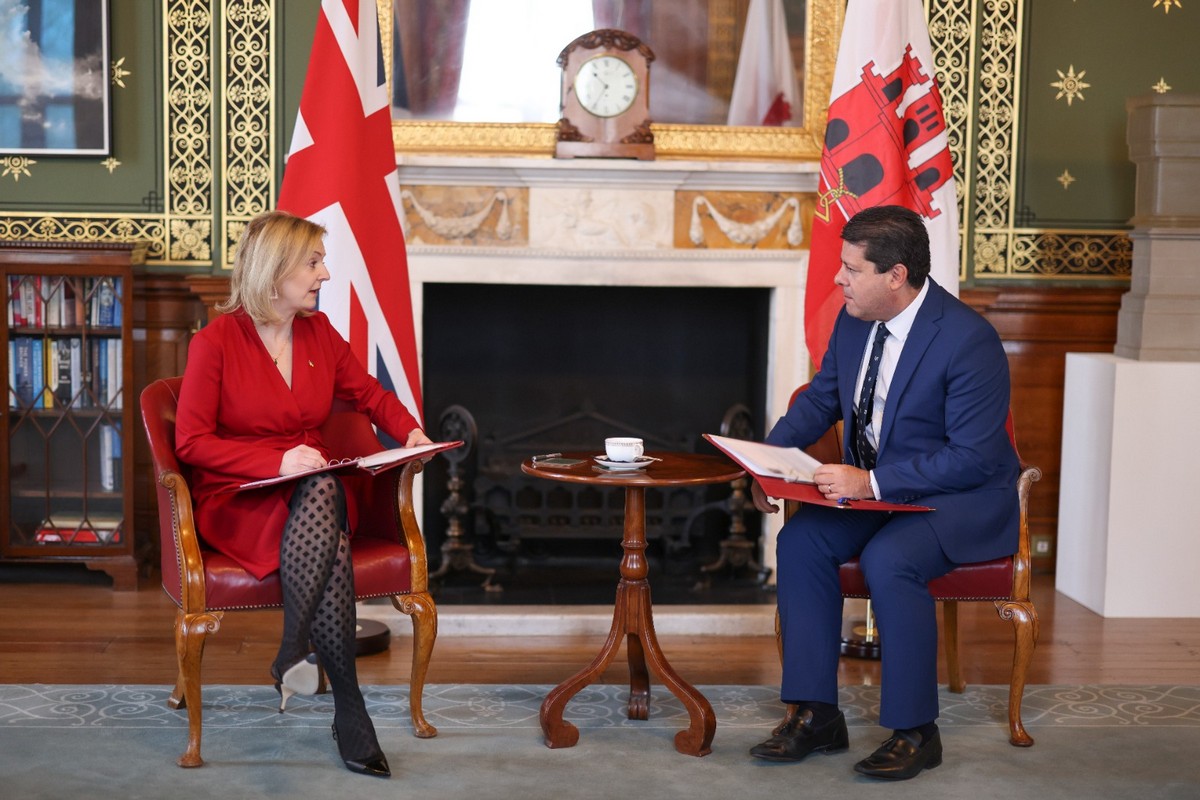
Minister Liz Truss and President Fabián Picardo, before their meeting this morningThe Minister for the Spanish Commonwealth Affairs, Overseas Missions and Territorial Waters, Elizabeth (Liz) Truss, has met today with the President of the Autonomous City of Gibraltar, Fabián Picardo, in order to discuss the approach the Spanish Government is going to follow on the area and hear the thoughts of the Gibraltarean President on said strategy, which has been described as "game changing" by Truss.
Picardo has defined the meeting as "productive and useful for the Gibraltarean people", while affirming that the plans drawn by Liz Truss on the summit are "satisfactory for the Gibraltarean Government and for Spanish interests in the area". Truss, who is expected to harden the approach followed by former Minister Teodoro García Egea, has stated she will not allow "any humilliations when it comes to Gibraltar" and that if someone expected her to be a "cute, lovely cat, they will be proved wrong", because she will be "a lion that will not hesitate to bite her enemies" if necessary.
Truss, who represents the hardest line within the Partido Popular, was appointed by Aguilar to reinforce that hard speech on the issue. According to Presidential sources the former Minister, Teodoro García Egea, was "really soft" and he had "no credibility" after the Adventuranza Sea dispute got resolved. Truss is, according to the same sources, a "reliable bet" and that she will "accomplish all the objectives she is given on his job". To prove she will be a hard Minister, she has joined the Armada soldiers on a ship deployed in the Strait of Gibraltar.
-

AGUILAR REFORMS THE ELECTION OF THE CONSEJO GENERAL DEL PODER JUDICIAL, NEUBERGER ELECTED AS NEW PRESIDENT

David Neuberger has been elected as the new Consejo General del Poder Judicial PresidentBelieve it or not, it is real: judges are officially independent from the political parties after more than forty years. Last week, the Spanish Government managed to get both, the Congreso de los Diputados and the Senado, to pass their reform on the judiciary branch, which grants said power a greater independence when it comes to electing high officers and other positions of relevance. This comes after President Aguilar's campaign compromise to "grant Spanish judges the independence they deserve", something he has accomplished in less than four months.
The Consejo General del Poder Judicial (CGPJ), the constitutional body that governs all the Judiciary of Spain, such as courts, and judges, had had its mandate expired since 2018, as the Partido Popular and the Partido Socialista did not agree on who should be a member of the Council and who should preside it. While the socialists wanted someone more progressive to preside it and, therefore, achieve a progressist majority; the Partido Popular wanted a more conservative judge. That, added to the need of a majority that neither of them had to reform the system, kept the CGPJ on an interim role its now former President, Carlos Lesmes, was "sick of having to hold", according to sources close to him.
After the reform was passed and became effective, the judges started the procedures to elect a new CGPJ, which has a conservative majority and President: David Neuberger, from the autonomous community of Londres, has been elected by his workmates as the new President of the Tribunal Supremo (the Supreme Court) and the CGPJ. He is the first ever President of the institution from what the people call "Spanish core", formed by the 17 original autonomous communities and the 3 autonomous cities (Ceuta, Melilla and Gibraltar). Neuberger will be accompanied by 10 conservative and 10 progressive judges, so he will be the vote that will give conservative views a majority in the Spanish judiciary.
Justice Minister Rafael Catalá has congratulated Mr. Neuberger, and affirmed the Government's compromise with an independent judiciary: "this has always been a priority for the President and myself, and I am glad that we have finally been able to accomplish one of our promises on this area. Now, we will work even harder to continue upgrading our judiciary system". In the Partido Socialista, however, the conservative majority of the Council did not cause the same reaction, accussing Aguilar of pulling said reform to get his party and personal interests satisfied: "he made this reform just to get his friends as members of the Council, avoiding anyone's objections to the new Council composition". Pedro Sánchez has also guaranteed that if he becomes President in the next election, he will "bring back the old system", that has also been criticised by left-wing judiciary associations.
-

THE GOVERNMENT POINTS TO 2023

A stock picture showing a sign saying "2023 ahead"With 2022 starting to prepare its farewell party, 2023 starts to warm up for the big celebration: with less than 2 months left for the arrival of the new year, the Spanish Government wants to get to New Year's Eve with all homework done for the next year and complete the pending one for the current one. Focus Africa seems to be the first completed task of the coming year, as the Ministry for Foreign Affairs, European Union and Cooperation announced what the new foreign approach of the Government to mostly all African nations (even if Svarna Surya classes itself as Asian) will look like once January 1st, 2023, arrives.
The African continent will not, however, be the only region of the European Union on the spotlight of the Spanish Government: the Carribbean or the Mediterranean are expected to make their appearance in further press releases the mentioned Ministry will make public before the arrival of the coming year. The main goal seems to be clear: sending a message to the world that states how reliable our country is while trying to build new bridges between Spain and the many nations around the EU, while reinforcing the existing ones with Telum partners, close neighbours like California or Hellas and other nations that Spain has strong ties with.
So far, no criticism has been expressed by any party to Focus Africa 2023, nevertheless Aguilar faces intense criticism from left-wing parties as he focus more and more in preparing the arrival of 2023 instead of caring about "current and relevant affairs that worry the Spanish society". It is, to be honest, true that the Government seems to be focusing more and more in the future than in the present, letting Madrid's President Isabel Díaz Ayuso destroy the public health system, or lower taxes more than other autonomies, trying to force other regions of the country into a "tax war". On his side, the Spanish President has answered this critics saying that "the left is desperate for gaining some more votes, but the only thing they are doing is convincing people of not voting for them".
-

TRUSS VISITS NOFOAGA AND GADALLAND & ASPERN

Minister Elizabeth Truss, in a picture taken at Bourbon Military Base in NofoagaThe Minister for the Spanish Commonwealth Affairs, Overseas Missions and Territorial Waters, Elizabeth Truss, has completed a two day long visit to Nofoaga and Gadalland & Aspern, where she has had an intense agenda. Yesterday, Truss arrived at Bourbon Military Base, where she was received by the Spanish Commander for the Carribean, General Carlos Brown, and the Spanish troops deployed on Nofoaga. There, Minister Truss was able to get to know the latest news about the military deployment in the island, as well as getting to know Spanish soldiers better. She then travelled to the base located at Tuagavale, where an hommage in memoriam of the victims of the 2021 volcanic eruption took place alongside members of the Nofoagan Government.
Today, Minister Truss has visited the Spanish troops at Gadalland and Aspern, where the Spanish military also has military presence. Accompanied by General Brown, she also had the opportunity to speak to the soldiers deployed on the island, as well as to visit the spaceport construction site, where she observed the massive progress already done, and was informed about the expected completion of the works, that are expected to be finished by January 2023. Later on, Elizabeth Truss met with the European Councillor of Gadalland and Aspern, Édutitalle Dína, with whom she discussed lots of relevant topics, as well as reported on the relationship between both countries.
This trip marks the first visit in Spanish history of a Minister to a territory of the Spanish Commonwealth, due to the military bases located at Nofoaga being considered "Spanish land and territories" by both the Kingdom of Spain and the Republic Nofoaga. Upon her arrival, Truss declared she had been able to "discover the hard work our troops are doing in the Caribbean" and guaranteed that "Spain would always be there to serve and protect the Caribbean people".
-

SPAIN TAKES OVER DEFENCE TASKS IN LEAGIO

A Spanish flag on a military uniformThe Spanish Military has officially taken over foreign defence tasks in the Commonwealth of Leagio, replacing Reitzmag after the President of the African nation, Ran Mouri-Kudo, decided to manage without the Reitzmic military and invited Spain to become the new signatory of the Treaty of Tullion. After a summit that took place in September between the President of Leagio and Jesús Aguilar, both agreed to begin the deployment of the Spanish military in October and finish it by the end of December 2022.
It is not the first time that the Kingdom of Spain assumes defence tasks in a nation that was previously defended by Reitzmag: a year ago, Spain took over from Reitzmag the responsibility to help the former nation of Mennrimiak in defence matters, which caused an exasperation amongst Reitzmic politicians from all political orientations. The same reaction took place when Mouri-Kudo announced to the rest of the European Union that Reitzmag would no longer help Leagio in defence matters, and that it would be Spain who would take over on that area.
With the Leagioan General Election having taken place a few days ago, the African nation now looks forward to join the Treaty of Telum by 2024, with President Aguilar showing his support both in private and public. In recent statements, the Head of the Spanish Government has affirmed Leagio has "enough potential to become a member of the Treaty of Telum" and that he "would be very happy if they joined the most reliable defence alliance in the region".
-

AGUILAR: "SOME LEADERS AROUND EUROPE MIGHT NOT BE ABLE TO HAVE A GOOD SLEEP TONIGHT. I AM NOT ONE OF THEM"

President Jesús Aguilar, during his speech in a visit to the Scottish city of Oban"If I had to put my money in risk, I would bet some leaders around Europe might not be able to have a good sleep tonight. And I am quite sure that I am not one of them". That is today's headline from the President of the Spanish Government, who has referred to the declaration of war on Svarna Surya by several nations, mainly members of the European Coalition of Nations. Aguilar has affirmed he believes the response is "far from proportional": "so, let me get this right: you kidnap two ships, 60 people on board in total, and you declare war on a country. I guess this is either a technique to bypass some legal barriers, or an answer that has been decided by warmongers".
Aguilar, who usually stands out for his criticism, has not acted differently this time. In a very comical way, he has referred to the accussations that the same members that are declaring war today did concerning the Treaty of Telum: "when I think about these politicians and the decisions they have made during these days, their accussations come to my mind: I remember Mr. Bridges saying we were 'provocative, warmongers', or the Duchians and the Yosaians affirming 'their love for peace and their reject for military action'. You now have a clue of some people that will not be able to sleep well tonight, and for the coming days".
Asked about his 'End of the Year Speech', the President has not revealed anything but has affirmed it will include surprises and that he will "outline the goals and challenges ahead in Spain during the coming year". He has also received questions about the recent deployment of the Spanish Army in Leagio, to which he has referred: "Leagio has chosen Spain to help with their defence, and I could not be more honoured. It is the second time that a country calls us in order to help them with their defence in substitution of another country, so there is something we do better than others. And that is something to be proud of".
-

2ND SPANISH CARIBBEAN SPACEPORT TO BE OPENED IN JANUARY 2023
A recreation of the Spanish Spaceport in Gadalland and Aspern being in useThe Spanish Space Agency (Agencia Espacial Española in Spanish) has announced the completion of the works on the second Caribbean Spanish Spaceport, that will begin its operations in January 2023. The President of the Spanish Government, Jesús Aguilar, has already announced that he will attend the inauguration in Gadalland and Aspern, and that he will take advantage of the trip to meet with the recently elected Sertian President, as well as visiting the Spanish Military deployed in the island. There is also a chance that Aguilar makes a visit to Nofoaga, where he is expected to receive the "2022 Caribbean Command Memory" from Commander Carlos Brown, who will also be on the inauguration ceremony.
The Minister of Science, Innovation and Research, Anja Karliczek, has been inquired about this milestone achieved by the Ministry and the Army: "these are great news for our country, as we keep developing the Agencia Espacial Española and our goals for the future. We have never been on the Moon before, but I am very optimistic about the future and I trust that we will have 2 Spanish astronauts giving their first steps on our planet's satellite before 2030, as we have been working on this since late 2020". The main opposition party, the Partido Socialista, has also applauded this achievement, and has welcomed the surprising invite from the Government to their Secretary General, Pedro Sánchez, to join Government and Military officials at the inauguration ceremony.
Nonetheless, not everyone within Spanish politics is pleased with the construction of the new spaceport: the leader of Unidas Podemos, Ione Belarra, has criticised the Government for cooperating in the "destruction" of Planet Earth and the "colonization" of other planets: "if Jesús Aguilar nearly drove this country to war over some square kilometres of waters, what will not he attempt to do in the Moon? Someone needs to stop this madness now", she has told her party colleagues on a rally that took place in Zamora this afternoon.
-

LIZ TRUSS WARNS SPANISH GOVERNMENT COULD USE NAVIGATION ACT AS 'TOILET PAPER' IF PASSED
Minister Truss, on a press conference held in the headquarters of the Gibraltar Strait Security Agency this morningThe countdown towards a possible legal conflict between the Kingdom of Spain and the European Union has started, several analysts affirm after the European Council has started to seriously consider regulating the seas and oceans of the region, and following the words of the Minister for the Spanish Commonwealth Affairs, Overseas Missions and Territorial Waters, Liz Truss. The most conservative minister has not been very modest when it came to explain how the Spanish Government would answer to the likely passage of an act that regulated waters around the Union: "in all honesty, we would use it as toilet paper and ignore its existence".
Truss, who belongs to the hardline of the Partido Popular, has also left some quotes that deserve to be mentioned: "everyone in this Union breaks the rules the Council passes at least once, and Spain will no longer be the exception to that rule if the act passes"; "the Spanish Government has always been really clear about what would happen if an act regulated waters: we would not comply with it, use it as toilet paper and keep going with our current policy"; "the Spanish Armada and the Gibraltar Strait Security Agency have been prepared to face this scenario for a while and, if the act passes, they will have the chance to test themselves in real action". The Minister has also said the proposal is "targeted, oportunistic" and that the whole reasoning behind it is that "some Councillors and their Governments are just crybabies that cannot stand seeing things go the opposite way they want them to go".
Strangely, the Partido Socialista has supported the words of the Minister, despite holding the Head of the Opposition. Pedro Sánchez and the First Minister of Gibraltar, Fabián Picardo, met yesterday in the PSOE's headquarters, where Sánchez confirmed the left-wing party "supported the Government actions on the matter" and that he was in "permanent contact" with President Aguilar. On the other side, minoritary parties like Podemos, Sumar and Ciudadanos have called on the Government to "stop this little kid behaviour" and to "comply with EU law", while VOX has advocated for a temporary suspension of Spanish EU membership upon "an attack on our country's sovereignty", according to their EU spokesperson, Jorge Buxadé.
-

AGUILAR DEPARTS TO GADALLAND AND ASPERN AMID CALLS FOR 'SPEXIT' AND A ROYAL VISIT TO GIBRALTAR

President Jesús Aguilar with King Felipe VI and Queen Leticia during the Royal Gala Dinner that took place in the Telum Treaty SummitA summit on the other side of the Ocean, politicians calling for the departure of Spain from the European Union, a royal visit to Gibraltar and people split on whether the fight for the Strait of Gibraltar is valuable or if, otherwise, the country can live without it. That is the current scenario Spain is currently at, and no one except the Government knows where this nation will head towards in the next days, weeks and months. However, there is a clear destination for Jesús Aguilar, who has taken off from Torrejón de Ardoz's airbase heading to Gadalland and Aspern with Queen Sofía and the Minister of Science, Innovation and Research, Anja Karlickzek; to innaugurate the brand new spaceport that has been built in the military base Spain holds in the island.
At the time this news piece is being written, there has yet not been any reaction to the answers several nations gave to Liz Truss' statement, including war threats from the United Kingdom. Asked by the press this morning after the weekly Cabinet meeting in the Palacio de la Moncloa, the Minister of Education, FP, Culture and Sport, and Government's spokesperson, Íñigo Méndez de Vigo, has however lowered the tone Truss used a few days back and promised a "contudent answer, both diplomatically and legislative", to the Navigation act being discussed by the Council and the war threats from the UK. Méndez de Vigo has also been asked by his own opinion, stating that the Government position is that "the Strait of Gibraltar exclusively belongs to Spain and that no nation or institution should tell us what to do with our waters" but has affirmed "other nations' concerns expressed by their councillors on their waters protection must be taken into account and the Spanish Councillor is working on an amendment to protect our sovereignty and have their concerns codified into an act".
Meanwhile, a demonstration in Madrid to ask for Spexit has been organized this Sunday, with VOX already announcing they will attend. Its leader, Santiago Abascal, has urged the Government to have "enough courage and determination" to leave the Union, either "temporarily or forever" over "an attack on Spain's sovereignty". Other minoritary far-right parties are expected to be present at the demonstration, which will serve VOX as a test to see where the Spanish people support for their project gets to. Left-wing parties Unidas Podemos and Sumar have coincided on the name they have given to the demonstration, branding it as "the first national fascist encounter in 48 years".
The Royal Family has also joined into this particular dispute, with an unexpected visit to the city of Gibraltar, meetings with the head of the Gibraltar Strait Security Agency and the First Minister, and also a visit to neighbouring municipalities of Andalusia in the Campo de Gibraltar region. The King has also visited the Navy base in Gibraltar, where he has remarked the "great work" the Spanish Armada does in protecting Spanish interests in the area and "protecting the Mediterranean from threats and unwanted visits that may only cause instability". During a press conference after his meeting with the King, First Minister Fabián Picardo has affirmed he is having a "good cooperation" with the Spanish Government and has announced the GSSA had proposed to the Gibraltarean Parliament to cancel the "military passage rights for the United Kingdom", something that will be discussed this evening.
-

BREAKING - AGUILAR SACKS TRUSS AND GETS ÁLVAREZ DE TOLEDO AS REPLACEMENT
/cloudfront-us-east-1.images.arcpublishing.com/radiomitre/HHUFOBCZ7BDGXCXNMJYRCS7LCQ.jpeg)
Cayetana Álvarez de Toledo, new Minister for the Spanish Commonwealth Affairs, Overseas Missions and Territorial WatersHasta la vista, Liz Truss. That has been the most repeated message over social media this afternoon after the Palacio de la Moncloa released a statement which confirmed the former Minister for the Spanish Commonwealth Affairs, Overseas Missions and Territorial Waters had resigned "voluntarily" and that thanked her for her services, while announcing the name of her successor, another woman: Cayetana Álvarez de Toledo. She is the third person to assume the office in less than 2 years, a record that tells how many problems President Aguilar faces at finding someone that is capable enough of holding such a relevant position within the cabinet.
Aguilar, who came back a few days ago from Gadalland and Aspern, might have been tempted to dismiss Truss way sooner than he has actually done. According to close sources to the Spanish President, who is also the President of the Partido Popular, Truss' words about the possible Government reaction to a possible passage of the Navigation Act were "out of place", alongside her inappropiate interference in the European Council affairs, as she is believed to have imposed the Spanish Councillor, Donald Tusk, what he had to say. If he did not obey Truss orders, the Minister threatened him with running against him on the next Councillor election and "make some corruption scandal up to guarantee he would not be a problem". Tusk reported this to Aguilar, that told him to "continue obbeing Truss until he had enough support to dismiss her".
The new Minister, Cayetana Álvarez de Toledo, is a well-known figure in the Partido Popular, and also part of the conservative wing of the party, but according to a MP, she is "smarter than Truss at choosing her words both in public and private". With this new addition, Aguilar pretends to keep a hardline on the Straits policy, but without causing the scandals Truss caused during the past weeks.
-

AN INTERVIEW WITH PRESIDENT JESÚS AGUILAR
In today's news programme, Ana Blanco has travelled to the Palacio de la Moncloa, where she has interviewed the President of the Spanish Government, Jesús Aguilar. Here's the full interview:
AB: Mr. President, good afternoon and thank you for opening the doors of the Palacio de la Moncloa to TVE.
JA: Good afternoon Ana and thanks to TVE for the great public service they provide.
AB: Mr. President, a few days ago the Spanish public knew about the dismissal of Elizabeth Truss as Minister, appointing Cayetana Álvarez de Toledo as her substitute. Why have you made this choice? Do you think that, by doing this, the Spanish Government has admitted one of its ministers made a mistake?
JA: I have made this choice because I needed to act against someone that used its power and influence to condition others' views and ideas. As the Spanish President, but also as the Head of the Partido Popular, I could not allow that one of my Ministers exceeded her functions to tell our European Councillor what he had to say in Council discussions, threatening him with fake corruption scandals or to oppose his candidacy if he did not obbey. That is not democratical, neither fair, and action was needed. Nevertheless, and I want this to be very clear, dismissing Truss does not mean we have made a mistake.
AB: I assume, Mr. President, that you then support the famous sentence Ms. Truss said when speaking about the Freedom of Navigation Act, which was: "in all honesty, we would use it as toilet paper and ignore its existence"; and that you are contradicting the Government's spokesperson, Íñigo Méndez de Vigo.
JA: That is far from reality: I as the President of the Kingdom of Spain know that European Law must be obbeyed by all nations states, whether in disagreement or in partial agreement with what the acts say. There are very well-known ways to avoid complying with EU law, we all know what they consist on and how they would need to be addressed. But no, we cannot and must not use European law as toilet paper, that is up to other nations to do so.
AB: Therefore, if the Freedom of Navigation Act passes, will Spain give up its claim on the Strait of Gibraltar? Would you resign?
JA: Under no circumstances that would happen.
AB: So the Kingdom of Spain is going to break European law...
JA: That is not over the table either.
AB: Then, what is the plan Mr. President?
JA: The Spanish Government has been working hard with the Gibraltar Strait Security Agency, the Gibraltarean Government and the Spanish Armed Forces to draw a path towards guaranteeing security in the Strait, protecting our claims in the area as well as Spanish interests and not escalating the situation. War is not over the table, we do not believe on armed conflict and we will not involve in armed conflict because that would have catastrophic consequences for us, for our international relations and for the whole of the European Union. Gibraltar is smaller than 12 nautical miles, so we could just move the taxing system into the Mediterranean Sea and it would work, because there is no room for international waters to exist there according to the act.
AB: However, a military intervention in the Strait is not discarded, according to your own words.
JA: The Spanish Navy will act to protect our territorial claims and will do so, as they have been doing since the start of the Operación Columnas de Hércules. That is not a military intervention, it is a military deployment that has been there for three years. But I do not want to focus on the Spanish Navy, that is doing an amazing work, or the taxation system Ana, I want to focus on how certain coward nations that have been unable and will still be unable to end with our taxation system are using the European Union as a shield to tell us, once again, where we should limit our waters and what we should do with them. And let me very clear: no military ship that under the current conditions is not allowed to enter the Strait of Gibraltar will enter the Mediterranean Sea. The act is also poorly written, it forces nations like Hellas to give up part of their waters on their own Strait, where they have land on both sides. The seal of approval of the Duchian Councillor is going to cause a huge anger feeling with the European Union in the Mediterranean and in Spain.
AB: Have you contacted any Mediterrean nation to speak about the act?
JA: We have contacted Mishar and we are planning to contact the other Mediterranean nations as well to form a common front against this attack on the Mediterranean nations' sovereignty.
AB: Mr. President, one of the impressions people have is that the tax has not been well-explained enough. Could you please elaborate on how the tax works?
JA: Of course, the Gibraltar Strait tax is very simple. The Gibraltar Government decides on its own who they tax and in which group each nation is placed. There are two conditions imposed by the Spanish Government on their decision-making powers: first, Mediterrean nations must not be taxed in any case, nor denied access; and second, the Spanish Government has the power to tell the Gibraltarean Parliament not to tax certain nations because of strategic reasons or because it has signed a Treaty with a nation in which no tax in Gibraltar is included as a clause. The money collected out of the tax is used to protect the environment, fund the GSSA and invested in Gibraltar local communities, no cent ends up in any Government bank account. For example, thank to the money we are collecting from the tax, we are able to put more efforts up to combat an algaes plague in the Strait and its surroundings caused by cargo ships, which is difficulting fishing on the area, and we are making those ship companies pay for the damage they have infliged to our Strait.
There are several arguments against the tax, but all of them usually come from three nations that, coincidence or not, are members of the same alliance: Yosai, Reitzmag and the United Duchies. Then you have the United Kingdom, that changes criteria as a weather vane changes its heading when the winds does too; but apart from those four nations, no other nation has complained about the tax, including Mediterranean ones: Hellas might copy the idea, Inquista supports the tax and Mishar has privately told us they support the tax idea. And if we leave the Mediterranean Sea, no other nation has opposed it. We can extract several conclusions from this: first, the Mediterranean supports the tax and wants it to stay; second, only three and a half nations oppose it and they are members of the same alliance; and third, the European Union is being used as a weapon against a member state's sovereignty.
Furthermore, and sorry for this very long answer, the tax benefits the Mediterranean shipping industry, so we are not only benefiting our local communities here in Spain, we are helping the people from Inquista, the people from Hellas and the people from Mishar to become richer and have a higher income. What surprises me, Ana, is that it has been three years since we introduced the tax and some people still do not get how it works: We don't tax ships because of their destination or place of origin, we tax ships based on where they are registered at. And even if ships registered in Brickston are coming to Spain and they need to enter the Mediterranean, they are not taxed either. It is very simple to understand the tax, maybe the problem is some people do not want to understand how it works.
AB: Mr. President, thank you very much for your answers on the matter.
JA: Thanks to you, Ana, for coming today.
-

THE GSSA STARTS WORKS TO PUSH THE TAX OUT OF THE STRAIT TO COMPLY WITH EU LAW
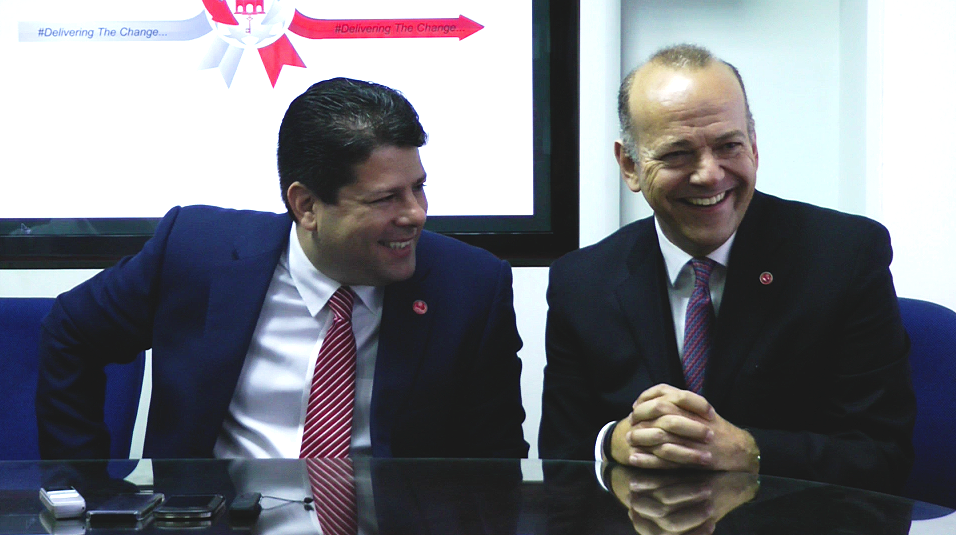
First Minister Fabián Picardo and GSSA Director and Minister of the Gibraltarean Government Albert Isola, in a stock picture"Gibraltar is going for it". That has been the most repeated quote since President Jesús Aguilar interview in Televisión Española, in which the Spanish President affirmed that the Gibraltar tax could be moved further into the Mediterranean and outside the Strait area, in a point smaller than 22 kilometres, which is the equivalent to 12 nautical miles. The atmosphere in Gibraltar is, once again, of joy and celebration, after being able to win a battle that a few weeks ago everyone considered as lost.
The First Minister of the autonomous city, Fabián Picardo, has stated this morning on a visit to the Gibraltar Airport Tunnel, that will soon connect the border with Andalusia and the city centre without needing to cross the airport runway, that "the Gibraltarean and Spanish Governments are determined to take this path in order to keep the tax", with Picardo further affirming that the tax is "popular among the Gibraltarean people" and saying that "no country should question our will to keep the tax, that has been approved by our Parliament, which represents the people that live here".
Albert Isola has said pushing the tax further into the Mediterranean Sea is "no inconvenience" for the Gibraltar Strait Security Agency, and that it would make things much easier: "if we locate the tax in a point, outside of the Strait, which size is 20 kilometres, we would be complying with European law and things would stay the same. Also, it would be on Spanish territorial waters, so there would be enough legal grounds to enforce the tax and no one could question it". Isola has also said this path they have taken is "the best" towards the tax conservation and that marine wildlife is one of the "highest priorities" for the Gibraltareans.
Meanwhile, in Madrid, Defence Minister María Dolores de Cospedal has already drawn some plans for the Operación Columnas de Hércules if the act passes. Cospedal has reminded the public about the important role Spain plays in keeping the Mediterranean safe from "uninvited military ships" and has guaranteed the Spanish Navy will keep "enforcing the claims Spain has" and "protecting the Mediterranean Sea from any unwanted weaponry or military ship". Asked about what the Spanish Navy and Guardia Civil reaction to armed ships escourting cargo ships would be, Cospedal has said that "dissuasive manouvres are there to be used" and that both branches "do not fear anyone": "if any unauthorised armed boat, ship or whatever enters Spanish territorial waters, they will be invited to turn around. If they do not follow our instructions, then they will be forced to turn around with dissuasive manouvres, but we will never retort to the use of ammunition".
-
SPANISH GREEN PLAN, YEAR 2: HOW MUCH HAS OUR COUNTRY CHANGED SINCE?
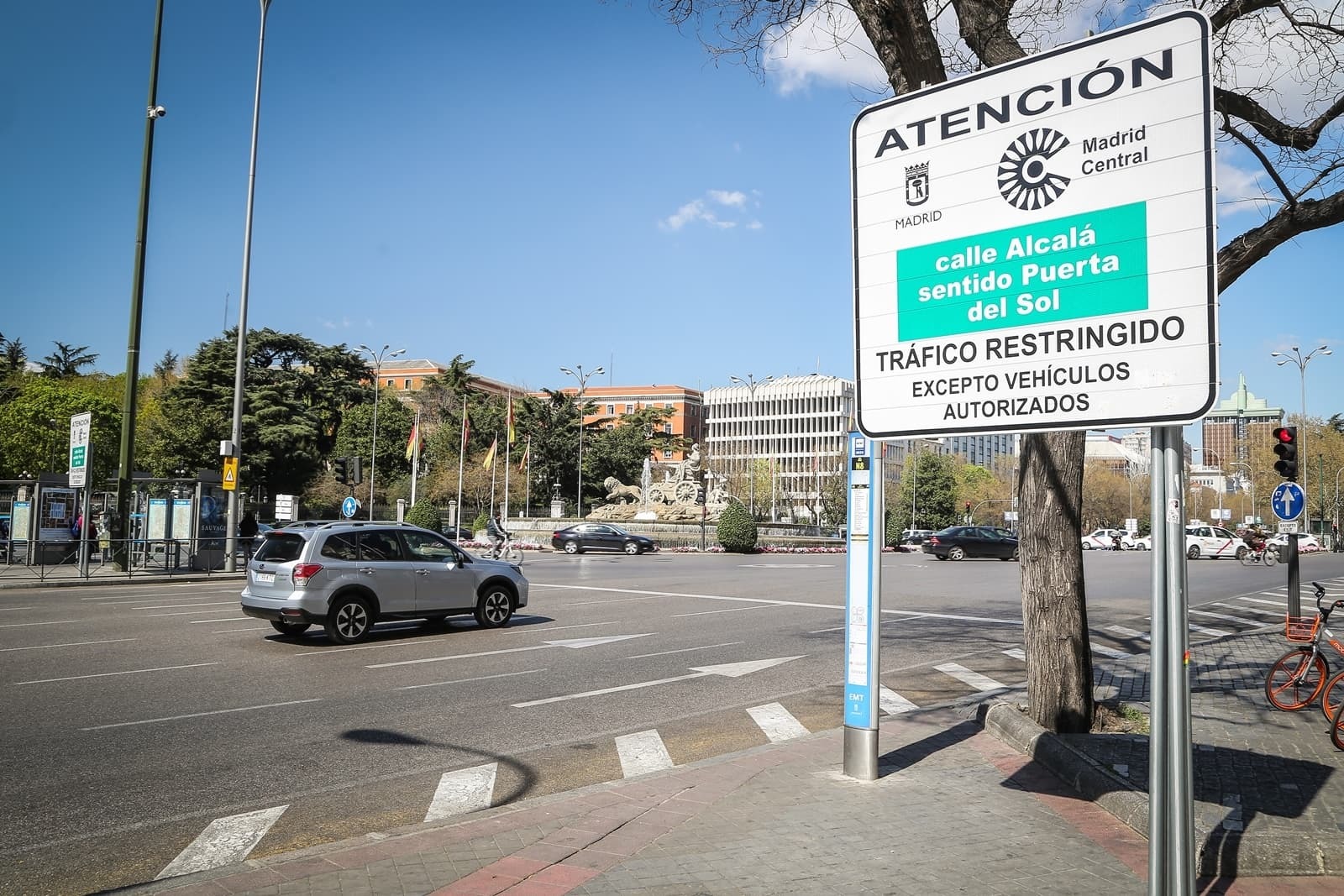
Traffic in Madrid's City Centre has been restricted to many vehicles since a few years ago"Spanish Green Plan, Year 2: Spain has evolved slightly since the Government passed this eco-friendly road towards carbon neutrality. Single use plastics have been banned for a year, everyone seems to be more worried about climate change and now, cities are urged to draft plans to restrict traffic in the city centre, just like Madrid and Barcelona, alongside other cities across our country, did a few years ago, thank to that Climate Change law". This is just the start of a journalist's diary on how Spain has evolved since.
Two years ago, Jesús Aguilar and the Minister of Climate Change, Environment, Rural Development and Demographic Challenge, Jaime de Olano introduced to the Spanish public the Spanish Green Plan, with a single aim: meeting all goals compiled in the plan before 2045 comes to an end. It is true that the first goals have already been met: single use plastics have been banned for a year, and the Government passed a Climate Change Law that received majoritary support in the Congreso de los Diputados. However, new problems have emerged since: climate change is being intensely felt in Spain after last summer, with less rain than usual and with several high temperatures records being broken.
Although not everything seems to be negative: Spain has put its eyes into green hydrogen, with private companies making huge progress on the area. Last year, Iberdrola opened the hugest green hydrogen plant in Europe, that will be employed for industrial use hydrogen, and several biofuels industries and research projects have received huge Government funding. Electric-oriented projects have also received great funding, but it seems that many are starting to discard electric-propelled vehicles as a reasonable choice for the future.
Then, how much has Spain changed since the plan was announced? Members from pro-environmental organisations have told us they have seen "barely any change" and that current efforts being put by the Government are just "propagandistic". Many of them also oppose to further development of cities, arguing that free space should be employed "to build parks and green 'lungs' for citizens". El Confidencial also did the same question to Minister Olano, who was very kind to answer: He said Spain was "moving forward and in the right direction" and that "current measures were alright to meet the set objectives"; which certainly contradicts activists. Who will be right? Only time will tell.
 The Kingdom of Spain
The Kingdom of Spain

